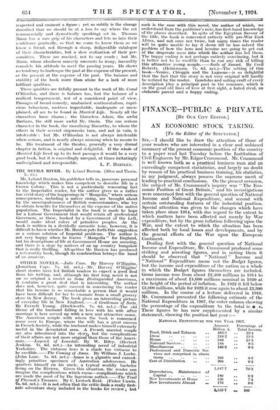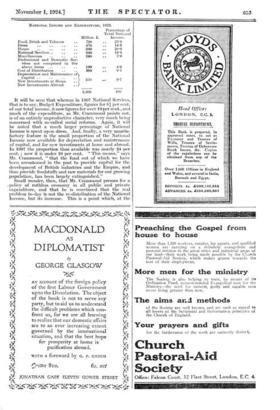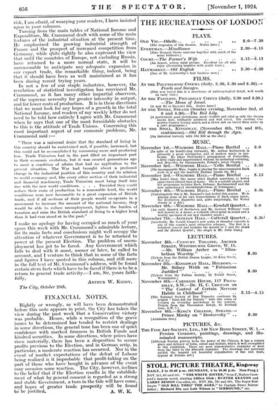FINANCE-PUBLIC & PRIVATE.
[BY OUR CITY EDITOR.]
AN ECONOMIC STOCK TAKING.
[To the Editor of the SPECTATOR.] should like to draw the attention of those of your readers who are interested in a clear and unbiased summary of the present economic position of the country to a paper read last Tuesday before the Institution of Civil Engineers by Mr. Edgar Crammond. Mr. Crammond is well .known both as a practical business man and an exceedingly competent statistician, and largely no doubt by reason of his practical business training, his statistics, in my judgment, always possess the supreme merit of leading to practical conclusions. On the present occasion, the subject of Mr. Crammond's inquiry was " The Eco- nomic Position of Great Britain," and his investigations were concerned first with the general question of National Income and National Expenditure, and second with certain outstanding features of the industrial position. Special attention was given to the changes which have taken place since 1914, with due regard to the extent to which matters have been affected not merely by War expenditure, but by the gross inflation following upon the War, and the extent to which the situation has been affected both by local losses and developments, and by the general effects of the War upon the European Continent.
Dealing first with the general question of National Income and Expenditure, Mr. Crammond produced some striking and arresting figures, and in noting them it should be observed that " National " Income and " National " Expenditure mean not the Budget figures, but the income and expenditure of the nation as a whole in which the Budget figures themselves are included. Gross income rose from about £2,400 millions in 1914 to a maximum of about £4,600 millions nominal in 1920 at the height of the period of inflation. In 1922 it fell below £3,000 millions, while for 1923 it rose again to about £3,300 millions. In the course of a lecture delivered in 1918, Mr. Crammond presented the following estimate of the National Expenditure in 1907, the outer column showing the percentage of the expenditure to the total in 0 . e. These figures he has now supplemented by a similar statement, showing the position last year :— N.ArioN-AL Earcrrorroor Yon ran YEAR 1907.
Amount. Million £. Percentage of Total Income.
Food, Drink and Tobacco • • 483'2 .. 22.4
Dress .. .. .. ..
2481 .. 11'5
House ._. .. • • ..
246
.11
'1P4 National Services.. .. .. 184
8'5 Miscellaneous .. .. ..
D16.3
'8'6 Professional and Domestic Ser- vices not comprised in above items .. 100
• •
4.6 Cost of Distribution .. • • 200
• •
9.3
1,647'7
761
Depreciation, Maintenance of
Capital .. . 180
• •
81 New Investments at Home 150
• •
7.4
New Investments Abroad
176 • -••
2,1531
NATIONAL INCOME AND ExpEarnrrusx, 1923.
Percentage of Total National Million £. Income.
Food, Drink and Tobacco 790 • • 23.9
470. 14'3 360 10•9 640 19'4
260 7.9 It will be seen that whereas in 1907 National Services, that is to say, Budget Expenditure, figures for 84 per cent. of our total income, it now figures for: over: 19 per cent., and much of the expenditure, as Mr. Crammond points out, is of an entirely unproductive character, very much being concerned with so-called- social reforms. Again, it will be noted- that a much larger percentage of National Income- is spent upon dress. And, finally, a very unsatis- factory feature is the small proportion of the National Income now available for depreciation and maintenance of capital, and for new investments at home and abroad. In 1907 the proportion thus available was -nearly 24 per cent. ; now it is under 10-per cent. " This means," says Mr. Crammond; " that the fund out of which we have been accustomed in the past to provide capital. for the development of British industries and the. Empire, and thus provide foodstuffs and raw materials for our growing population, has been largely extinguished." Small wonder; then, that Mr. Cramrnond presses for a policy of: ruthless economy in all public and private expenditure, and that he is convinced that the real problem: to-day is not the re-distribution of the National Income, but its increase. This is a point which, at the
• • • •
478
9.1
160 300
320 .. 97
3,300 100 House National Services.. Miscellaneous ..
Professional and Domestic Ser- vices not. comprised in the above items .. . Cost of Distribution Depreciations and Maintenance of Capital .. New Investments at Home New Investments Abroad ..
risk, I am afraid, of wearying your readers, I have insisted upon in your columns. Turning from the main tables of National Income and Expenditure, Mr. Crarrnnond dealt with some of the main features of the industrial situation at the present time. He emphasized the growing industrial strength of France and the prospect of increased competition from Germany, while qbite rightly he also expressed the view that until the countries of Europe, not excluding Russia, have returned to a more normal state, it will be unreasonable to anticipate any adequate expansion in our export trade, the remarkable thing, indeed, being that it should have been as well maintained as it has been during recent trying years. - In not a few of our staple industries, however, the revelation of statistical investigation has convinced Mr. Crammond, as it has many other impartial observers, of the supreme necessity for greater intensity in output, and for lower costs of production. It is in these directions that we must look for any hopes of a growth in the total National Income, and readers of my weekly letter do not need to be told how entirely I agree with Mr. Crammond when he says that one of the most formidable obstacles to this is the attitude of Trade Unions. Concerning this most important aspect of our economic problems, Mr. Crammond said :- " There was a universal desire that the standard of living in this country should be maintained and, if possible, increased, but this could not be accomplished by consuming more and producing less. Trade Unionism had in the past filled an important part in their economic evolution, but it was created generations ago to meet a condition of affairs that had no application to the present situation. The War had brought about a profound change in the industrial position of this country and its relation to world economy and, like every other section of their industrial and financial machinery, Trade Unionism must bring itself into line with the new world conditions. . . . Provided they could reduce their costs of production to a reasonable level, the world conditions were now favourable to a great expansion of British trade, and if all sections of their people would co-operate in a movement to increase the amount of the national income, they would be able to reduce unemployment, lighten the burden of taxation and raise the British standard of living to a higher level than it had over stood at in the past."
I make no apology for having occupied so much of your space this week with Mr. Crammond's admirable lecture, for its main facts and conclusions might well occupy the attention of whatever Government is to be returned to power at the present Election. The problem of unem- ployment has got to be faced. Any Government which fails to deal with it must, sooner or later, be called to account, and I venture to think that in some of the facts and figures I have quoted in this column, and still more in the full text of Mr. Crammond's address, will be found certain stern facts which have to be faced if there is to be a return to general trade activity.—I am, Sir, yours faith- fully, ARTHUR W. KIDDY.
The City, October 29th.












































 Previous page
Previous page